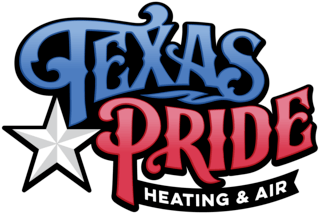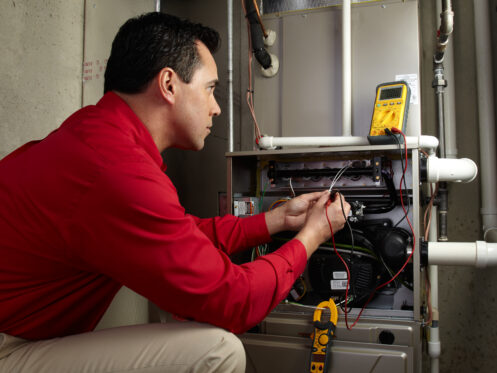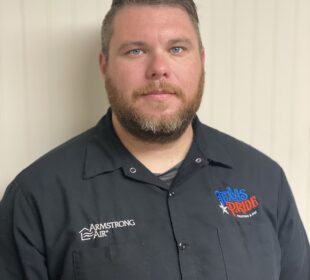Your furnace is the heart of your heating system. This central unit creates the warm air that is then pumped through your home. While the basic mechanisms are the same, the heating method in your house is dependent on the type of furnace you have installed. Let’s take a look at these different heating systems, their efficiency levels, and their methods of heating.
What Are the Basic Functions of a Furnace?
Heat is produced in the burner of the furnace. The heat is then sent through a flue to the heat exchanger, which further increases the temperature of the created heat. A fan blows air over the exchanger to warm it. The warm air is transferred to a blower, which pushes the hot air into your home’s ducting system. As the hot air fills the house, cold air is then taken back into the return ducts to repeat the whole process again.
The process is initiated by your thermostat when the temperature dips too low. The thermostat will send a signal to the furnace’s control board, which then turns on the ignition switch to start the process of heating the air.
What Are the Different Types of Furnaces?
The heat transfer process looks a little different with each type of system. Some heaters rely on propane, oil, or natural gas, while others run solely off of electricity.
In propane, gas, or oil furnaces, the oil or gas is heated in the burner, and then heated again and pumped through the home. An electric furnace works by a system of heated coils. Electric currents run through the coils, drastically increasing the temperature. The blower pushes air directly over the coils before going out into the ducting system.
The Importance of BTUs
When installing any type of furnace, it’s vital to select one with the proper number of BTUs. BTU stands for British Thermal Units, which is a fancy name for the amount of heat it takes to raise the temperature by one degree.
If your furnace doesn’t produce enough BTUs for the size of your home, it will always feel cold. The furnace will keep running to try to heat the house to the desired temperature, which can cause rapid wear and tear on the exchanger, the fan, and the blower.
On the other hand, if the number of BTUs is too high for your space, your home will reach the desired temperature too quickly, and then shut down. When the air cools off again in a short amount of time, the furnace will kick on again. This creates short bursts of hot air, which don’t heat your home efficiently. The furnace will start to short cycle, meaning it turns on and off again several times. The constant work will wear out the parts within your furnace too quickly and shorten the lifespan of your equipment.
If you’re not sure how many BTUs your furnace should have, don’t hesitate to call in an HVAC professional to help you find the right-size unit for your home.
What Are the Pros and Cons of Each Furnace Type?
As far as efficiency goes, natural gas furnaces are the most efficient systems. Oil systems are older, and while less expensive, they’re typically not as effective as gas systems. Electric furnaces can last 10 years or more. Propane furnaces are used most often in rural areas, where natural gas or oil lines aren’t available. Their efficiency is comparable to natural gas furnaces.
When it comes to the cost of furnaces, you’ll need to take into account installation as well as running costs. Natural gas furnaces cost more upfront to install, but the running costs are low. On the other hand, electric furnaces are the least expensive to install, but the operating costs will increase your electric bill. Oil systems are outdated and will likely cost more to maintain and keep running. Propane furnaces are similar in price to natural gas furnaces, but propane must be refilled on a regular basis and can cost slightly more than other systems.
Natural gas systems are most often used in highly populated areas where it’s easy to run gas lines. If you don’t live near a gas line, you won’t be able to connect your house to a natural gas system. Propane can be used in any location, but the propane has to be stored in a large tank, which can be problematic for homeowners with small yards.
At Texas Pride Heating & Air, we’re here to help with all of your heating needs in Keller and the surrounding areas. We’re happy to help you maintain or repair your current heating system or install a new one. Our team can also assist with AC repair, maintenance, and installation. Call us today for a quote!








